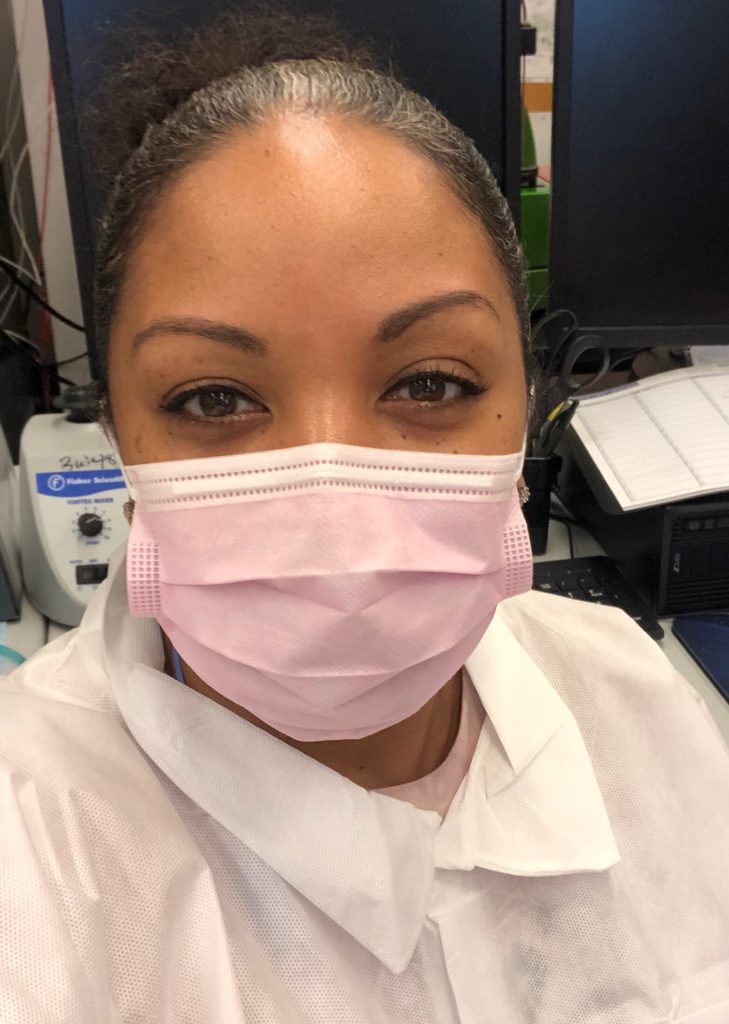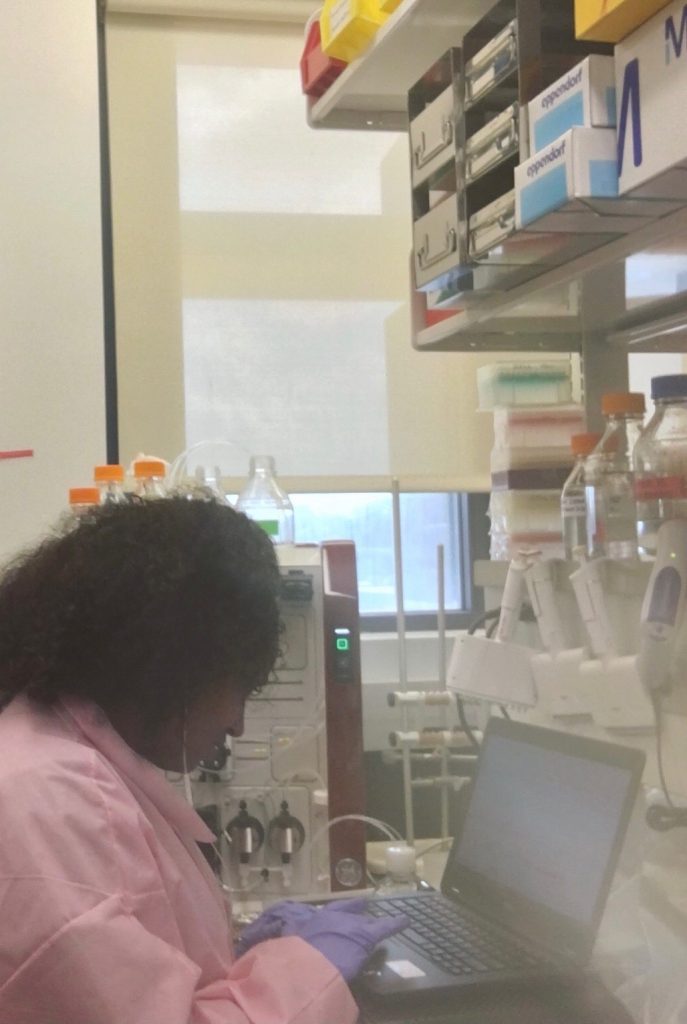
I interviewed a woman named Cysha Hall. Cysha is a lab manager of a malaria vivax lab, at Walter Reed Army Institute of Research. Located in Silver Spring, Maryland. Cysha has a bachelor’s degree in biology. These are the answers Cysha provided to the questions I asked.
- What inspired you to get into this field?
So when I was in high school there was a science and tech. program that I was in and once I entered college I really didn’t decide what to do. So instead of deciding what to do I just stayed on the path that I was on and eventually ended up in research. At one point I had considered entering the medical field but then I had my daughter pretty young, I was 23 when I had her so at that point I didn’t want to work an unpredictable shift. So I got into research and just kept going.
- What path did you take to get this career?
I first started out with a staffing company and I ended up working for a company that manufactures HIV testing kits. I worked in their quality control department where we ran a few essays before we would send the kits out. From there I ended up working in the same building that I work in now but it is owned by the navy and the army. So at one point I was working for the navy and that was a research lab. So I worked there in enterics, which is basically diarrhea. I worked there for a while and we were getting ready to start a clinical trial. Which would have involved analyzing human samples. So I decided it was time for me to go and there just happened to be a job. It was a better position, the management position versus just being a research tech. So that’s how I ended up here.
- What are the basic roles and responsibilities for your job right now?
I basically manage the day to day workload. What we are going to do for those days, my supervisor tells me “I need all of these ASAS run” and then she says “okay this is the priority”. From that point I decide what we’ll do day to day, who will do what, how many things we can multitask and do at the same time. I have two people in the lab that I manage so that is the managerial side of it in terms of working at the bench. I also run ASAS so usually I’m running around in, what I like to call, controlled chaos. It works out really well and it’s a really good environment. Aside from that I manage the budget, I’m a credit card holder, I place orders, I work with other departments to schedule our animal studies. I’m not as hands on in the animal studies anymore, that was at one point my role. My job is to train the employees that we do have at this point. I have gotten them pretty much up to speed but every now and then there is something else that comes up that they aren’t familiar with. I have to teach them. Where my supervisor does all the grant writing and everything else I’m her hands, her eyes, and her ears in the lab. If they have questions they come and talk to me to free up her time. We’re really busy usually.
- What is your favorite or most rewarding aspect of the job?
I like to pride myself on troubleshooting. I love to troubleshoot so sometimes it gets very frustrating but when I figure out how to solve that problem. As far as the ASA, a lot of the times your answers are no, no, no, no until you get to the yes part. So when you finally get to that yes! It is a very rewarding thing to have positive data come out and be able to take pride in the fact that you did that.

- What is the most surprising aspect of your career?
I think perhaps the fact that I never really aspired to do this but that in doing I’ve come out with publications, I’ve had awards, and to have my peers, my supervisors and what not recognize the work that I’ve done. At the end of the day I do it for the paycheck but then all those things come in and to see my family be proud of me. Things that I don’t think to say like “oh we just published a paper” and just have my family be proud of me and take some pride in what I do. Something that I don’t necessarily think about.
- What is the most challenging part of your career?
A lot of times working for the army there are a lot of taskers and things that come down the pipeline. They are “we need this done by 6 o’clock today” and it has nothing to do with science. It is all of the administrative red tape, when we have an inspection coming up and they’ve known for months but I have to jump in and pull all of that stuff off while at the same time generating data in the lab.
- What advice would you give to someone getting into the health field?
I think that if you are going to pursue something in science, know what you’re going to do and stick to it. With me I am fortunate to have made it this far with my bachelor’s. A lot of the other lab managers have master’s degrees and science was not something that I had planned to do. I just kinda got there and started making money. This works for me. So have some focus and direction so that you can make it farther. So if you want that phD then know what kind of direction you want to go in because there are so many things you can do. From the science and tech program I was in in high school I still maintained a lot of those friendships. I have friends that started off with bachelor’s degrees that are HR managers, I have a friend that’s a pediatrician, I have a friend that is a lawyer and a professor. Everybody just kinda branched off and started doing their own thing but we all started off in the same place. So kinda have a feel for what you want to do it just makes it a little easier.
- Do you wear a lab coat everyday? If so do you like it?
Yes, I wear a lab coat everyday. Do I like it? It is neither here nor there. I’m usually all fun and games in the lab. We can laugh and joke but there are things I am a stickler about. For example, acids and bases I don’t need you to burn yourself on my watch. There are certain things that I am strict about. I may see someone in another lab doing it and I go “hmm” trying to figure out a way to say it so that you don’t sound like somebody’s mom.
This interview was eye opening for me. I learned a lot that I did not know before. For example, the fact that I have the potential to work in a lab related to the navy or army. Also the fact that lab managers are still hands on in the lab and collect data as well. I always shied away from the thought of having a leadership role in the lab because I thought it would be more business or managing and less hands on research in the lab. Cysha also stressed to me the importance of a degree. She was fortunate enough to make it to where she is now with a bachelor’s degree but she also said life is a lot easier with a degree and stay in school, the rest will come. I enjoyed speaking with Cysha and she is an inspiration to me and other women wanting to go into research.